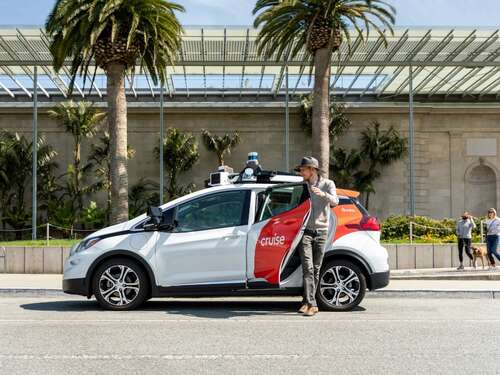
The suspension follows a number of road incidents involving Cruise robotaxis, including one where a hit-and-run victim was dragged 20ft under a driverless vehicle.
General Motors’ Cruise has suffered a hit to its operations, as its permit to operate automated taxis in California has been suspended.
The state’s Department of Motor Vehicles (DMV) issued the “immediate suspension” of Cruise’s autonomous vehicle deployment and driverless testing permits yesterday (24 October). The department said it can immediately suspend permits if there is an “unreasonable risk to public safety”.
The department determined that the company’s vehicles are “not safe for the public’s operation” based on their performance. However, Cruise is still able to operate vehicles that have a safety driver in them.
“The DMV has provided Cruise with the steps needed to apply to reinstate its suspended permits, which the DMV will not approve until the company has fulfilled the requirements to the department’s satisfaction,” the California department said in a blogpost. “There is no set time for a suspension.”
Road incidents
The suspension follows a serious road incident earlier this month, when videos emerged of a hit-and-run victim pinned under the back wheels of a Cruise robotaxi.
Cruise recently shared a “detailed review” of the incident and claims its automated vehicle (AV) braked aggressively after another car hit a pedestrian and flung the person in the direction of the robotaxi.
“The AV detected a collision, bringing the vehicle to a stop; then attempted to pull over to avoid causing further road safety issues, pulling the individual forward approximately 20ft,” Cruise said in the review.
The company claims that – based on its simulations – its robotaxis would have avoided the pedestrian if it was in the position of the human hit-and-run driver. Cruise also claims that its robotaxi’s reaction speed when braking was “faster than most human drivers”.
California’s DMV referenced several regulations in its suspension notice. One regulation suggests Cruise misrepresented information related to the safety of its autonomous technology.
Cruise taxis have been connected to a number of road incidents in recent months, which has raised concerns about the safety of autonomous vehicles. In August, one of the company’s taxis was involved in a collision with a San Francisco emergency vehicle.
That incident occurred a week after the California Public Utilities Commission (CPUC) granted both Cruise and Alphabet-owned Waymo the right to conduct commercial driverless taxi services “at any time of day” in San Francisco.
Last month, reports from the San Francisco Fire Department claimed Cruise robotaxis blocked an ambulance that was trying to reach a critically injured patient, who later died from their injuries. In July, a swarm of the company’s self-driving vehicles blocked several lanes of traffic at a city intersection.
10 things you need to know direct to your inbox every weekday. Sign up for the Daily Brief, Silicon Republic’s digest of essential sci-tech news.

